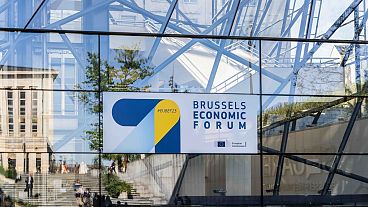Diplomats agreed the controversial plans at a meeting on Wednesday – but some say they don’t go far enough.
EU diplomats agreed Wednesday to use income from frozen Russian state assets to aid Ukraine – paving the way for the war-torn country to get around €3 bn for arms purchases and reconstruction before the summer.
Since the full-scale invasion of 2022, €210 billion in assets of the Moscow central bank have sat frozen within the bloc – chiefly at the Euroclear depositary in Belgium.
The deal was agreed “in principle” at a regular meeting of national representatives, according to a tweet by Belgium, currently chairing talks in the European Council.
Brussels has long touted using the interest from those funds, estimated at around €3bn per year, for Ukraine’s reconstruction costs – and later extended its plans to cover Kyiv’s military expenditure.
The plan – which also has backing from the group of seven leading industrialised democracies – comes as Ukraine hopes to turn the tide in an increasingly desperate military campaign, bolstered by €89bn recently agreed by the US Congress.
But Ukrainian ministers have said Brussels needs to go further than merely scooping up interest payments – and fully confiscate Moscow’s assets to ensure the aggressor pays for the cost of war.
Officials from EU countries and the European Central Bank have expressed concerns that seizing assets outright might set an unhelpful precedent or harm the euro’s reputation as a safe currency.
Talks were also held up by concerns over how many of the assets would be retained by Euroclear as an administration fee, a figure that was originally as high as 13%, as well as Belgium’s right to tax the profits gained by the Brussels-based securities depository.
Belgian Prime Minister Alexander De Croo has already promised to send some €1.5bn directly to Ukraine, though that appears to be a result of applying existing corporate tax law to the unexpected windfall Euroclear gains by having frozen central bank assets on its books.
The final deal allows Euroclear to keep a provisional buffer worth 10% of the profits, in case of litigation over the funds. It can also keep 0.3% as an incentive, while 90% of the funds will be sent via the European Peace Facility to help Ukraine buy weapons.
Commission President Ursula von der Leyen previously suggested Ukraine could receive the first funds under the mechanism by July – but the calculation will be backdated to February, when Euroclear formally segregated the assets.
Ambassadors today also formally agreed on the reforms Ukraine will have to make to receive funds from a separate €50bn facility of EU grants and loans.
UPDATE (8 May, 17:00 CET): adds clarification regarding litigation buffer.


